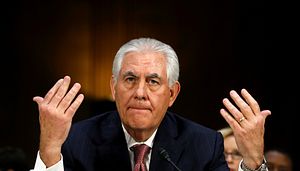Secretary of State-to-be Rex Tillerson testified to Congress on Wednesday that America needs to take a harder line against China in the South China Sea. “We’re going to have to send China a clear signal that, first, the island-building stops,” Tillerson said. “And second, your access to those islands also is not going to be allowed.” This tougher stance is necessary, he says, to deter China from further “pushing the envelope.”
James Kraska, Professor in the Stockton Center for the Study of International Law at the U.S. Naval War College, agrees with Tillerson, even while admitting that this could be a dangerous policy: “Wouldn’t this raise tension in the region? It surely would, but anything other than acquiescence to China’s unlawful claims will have to take on additional risk in the short term.”
There are several strategic justifications for why America must stand up to China’s expansive territorial and maritime claims in the South China Sea. One involves defending our allies in the region and making sure China’s activities don’t threaten their security. Another is about upholding international order and freedom of the seas.
The first justification is weak. In this context, America’s security guarantees in the region could be more trouble than they are worth, especially if, as Kraska says, it requires the U.S. to take on additional risks with a nuclear-armed rising power. Moreover, it’s not obvious that China’s territorial and maritime claims per se threaten the security of neighbors like Japan and the Philippines. The competing claims in the South China Sea have gained considerable symbolic importance on all sides, but do not seriously undermine anyone’s security and while some view China as a regional bully, few describe it as an aggressor state. Indeed, as Thomas Christensen explains, Beijing has a “hedging strategy” that calls for avoiding “direct confrontation [with] the United States and its allies.” M. Taylor Fravel similarly argues that China “has compromised more frequently than it has used force” and “has been less belligerent than leading theories of international relations might have predicted for a state with its characteristics.”
China’s neighbors, although certainly eager to let the United States take the lead in defending their regional interests, seem to have a more sober and realistic view of China than Tillerson. They cooperate diplomatically and trade with China when it suits them, and make a fuss when China seems to push the envelope. The Philippines has recently pivoted towards better relations with China, despite the fallout over the ruling, in the Philippines’ favor, of the Permanent Court of Arbitration (PCA) at The Hague. And Japan still spends only 1 percent of its GDP on defense, less than half the global average, hardly an indication that Tokyo expects a military clash with China over the Senkaku/Diayu islands.
The second justification, that America needs to uphold international law and order, is even more dubious. First of all, as a great power, China is in good company in ignoring the precepts of international law. As the Harvard political scientist Graham Allison recently made clear: “no permanent member of the UN Security Council has ever complied with a ruling by the PCA on an issue involving the Law of the Sea. In fact, none of the five permanent members of the UN Security Council have ever accepted any international court’s ruling when (in their view) it infringed their sovereignty or national security interests.” No state has sued the United States under the UN Law of the Sea because Washington refuses to ratify it in the first place. When the PCA ruled in 2015 that the United Kingdom violated the Law of the Sea over the Chagos Islands, Britain disregarded it. And in 2013, when the PCA ruled against Russia on the Law of the Sea over its seizure of a Dutch vessel off the coast of Russia, Moscow ignored it. So when U.S. officials say military action in the South China Sea is necessary to uphold international law, they’re applying the traditional “for thee but not for me” rule.
There is a longer term question about whether the South China Sea will serve as a precedent for China’s rise to superpower status, overtaking the United States and revising the international order. China’s surpassing of the United States in relative international power is a very long way off, but even if it were more imminent, it’s not clear that China intends to upend the order that it has spent the past three decades conforming to. After all, China has gotten rich and powerful under this system. Ryan D. Griffiths, in an article in the journal Security Studies (gated) has gone so far as to argue that a Chinese-led world order wouldn’t differ fundamentally from a U.S.-led world order, though in the realm of territorial integrity it may actually be more stable.
The current debate about America’s posture in the South China Sea reflects a very narrow conception of the strategic options at hand. It shouldn’t be relegated to either (1) drawing a red line against China over remote islands of negligible strategic importance to the United States, or (2) ceding regional hegemony to Beijing. It is clearly in the interest of the nations in the region to come to a mutually beneficial agreement that establishes norms of behavior with regard to military presence, resource extraction, access to shipping lanes, and other activities in the South China Sea. And such a diplomatic achievement is perhaps possible. But by focusing solely on a crude deterrence model in which powerful adversaries meekly back down in the face of U.S. threats, we not only forgo those other peaceful diplomatic options, we make them less plausible.
John Glaser is associate director of Foreign Policy Studies at the Cato Institute.

































